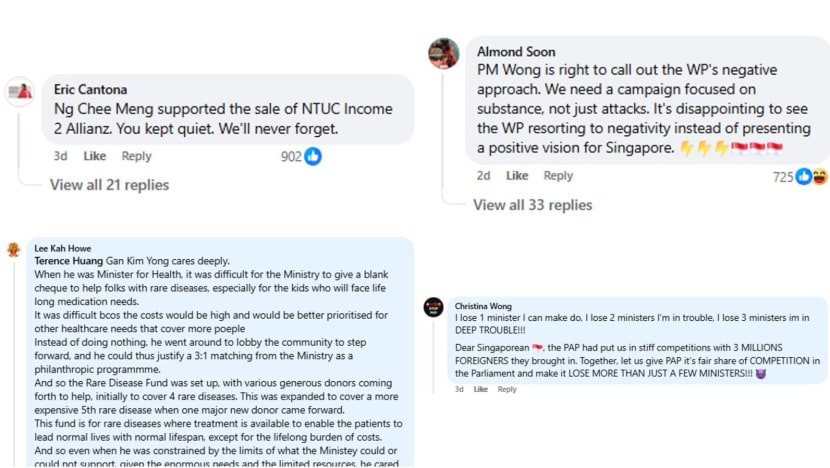GE2025: More than 1,600 suspected fake Facebook accounts posted 8,000 comments over 2 days on aborted Income-Allianz deal
┬ķČ╣ had looked at the comments section of 37 posts by news outlets between Apr 27 and 29.

Screen grabs of Facebook comments from suspected fake accounts (Screenshots: Facebook)

This audio is generated by an AI tool.
SINGAPORE: More than 1,600 Facebook accounts believed to be inauthentic have been detected posting 8,000 partisan and sometimes inflammatory comments in posts by news outlets over a two-day period, latest checks by ┬ķČ╣ have found.
From Apr 27 to 29, ┬ķČ╣ looked at 37 Facebook posts about two PeopleŌĆÖs Action Party (PAP) candidates ŌĆō 13 were posted by ┬ķČ╣, another 13 by the Straits Times (ST) and 11 by online media site Mothership.
The posts relate to Deputy Prime Minister Gan Kim Yong, who is part of the PAPŌĆÖs Punggol GRC team, the ruling partyŌĆÖs Jalan Kayu SMC candidate Ng Chee Meng, as well as the follow-up news articles on what the PAP and WorkersŌĆÖ Party (WP) had to say about the aborted deal between Income Insurance and German insurer Allianz.
┬ķČ╣ looked at a total of 16,811 comments in the 37 posts.
A total of 6,338 unique Facebook accounts were responsible for these comments. ┬ķČ╣ found that 1,631 accounts were identified as likely inauthentic. This represented around a quarter of the total number of users who left comments in these posts.
Another 1,428 accountsŌĆÖ authenticity could not be confirmed, as much of the data in these accounts were locked. The remaining 3,279 accounts are real.
Out of the 16,811 comments, 7,917 entries are believed to be inauthentic.
The latest analysis comes after ┬ķČ╣ published its findings on suspicious bot activity on Facebook on Apr 24 and on Apr 29. In these earlier reports, ┬ķČ╣ had examined three bot campaigns that targeted candidates from the PAP and WP.
BOT FRENZY, INTENSE BATTLE FOR ENGAGEMENT
Similar to past analyses, ┬ķČ╣ detected spam-like behaviour, indicated by a high volume of comments posted over a short period of time. These are signs of a coordinated bot campaign. For instance, within a one-hour period starting from 11pm on Apr 28, over 1,000 comments were made by the bot accounts in various posts.
In a video post by ┬ķČ╣ on the night of Apr 28, 39 unique fake accounts created 66 partisan comments over a period of 10 minutes.
Posts by the Straits Times received the most attention from bots in the latest analysis. A total of 942 fake accounts ╠²left more than 3,300 comments deemed to be inauthentic.
┬ķČ╣ŌĆÖs posts received ╠²2,980 comments from 909 inauthentic accounts, while MothershipŌĆÖs posts attracted 1,629 comments from 585 bots.
While bot comments generally do not get much engagement from other users, 104 comments in this campaign managed to attract 100 engagements each.
The top few most engaged bot comments reflected the narrative tug-of-war between the PAP and WP camps.
For instance, the top engaged bot comment was one that said that Mr Ng supported the sale of NTUC Income to Allianz. This comment attracted 909 engagements.
DUPLICATE SCRIPTS, POLARISING NARRATIVES
A few patterns also emerged in the latest analysis of bot content.
╠²
┬ķČ╣ found a heavy use of scripted comments by these accounts, which often made duplicated messages in the comments section.
╠²
For example, one comment that negatively targeted Mr NgŌĆÖs position as the NTUC secretary-general was repeated 48 times. Another comment that started off with ŌĆ£Gan Kim Yong cares deeplyŌĆØ was posted eight times.
╠²
In general, the accounts paint a polarising picture of these PAP personalities by putting forth theories that cast them in a strongly negative or positive light.
╠²
For example, the competing narratives around Mr Gan span from casting him as essential to SingaporeŌĆÖs governance, to pinning responsibility of the aborted Income-Allianz deal on the deputy prime minister.
╠²
These competing narratives reflect an intense contest between pro-PAP and pro-WP leaning accounts.
╠²
While comments of such nature are not unheard of online, the fact remains that these are made by inauthentic accounts.
╠²
The narratives pushed by these bots either sought to amplify public anger at the ruling party or instil fear about the opposition.
╠²
The Ministry of Digital Development and Information has earlier said it was looking into the fake accounts, in response to ┬ķČ╣ŌĆÖs report on Apr 24.
╠²
ŌĆ£We will continue to monitor the online space for foreign interference and will act on content that is in breach of our laws. We urge the public to be discerning consumers of information,ŌĆØ it said.
╠²
Facebook's owner Meta said on Thursday╠²that its investigations are still ongoing.
ŌĆ£We continue to make progress on our investigation, and at this point we do not see widespread inauthentic activity. We remain committed to safeguarding this election and will take action on anything that violates our policies,ŌĆØ said Meta's spokesperson.













